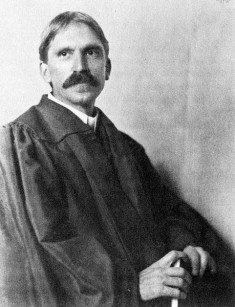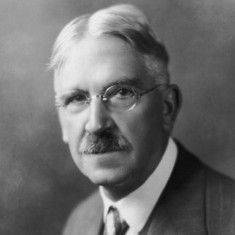| John Dewey | |
|---|---|
 |
|
| Philosopher | |
| Specialty | Pragmatism |
| Born | Oct. 20, 1859 Burlington, Vermont |
| Died | June 1, 1952 (at age 92) New York |
| Nationality | American |
John Dewey was a popular American philosopher and educational reformer. His ideas have been very influential in education and social reform. He was one of the primary figures associated with philosophy of pragmatism. He is also considered to be one of the founders of functional psychology.
Early Life
John Dewey was born on October 20, 1859, in Burlington. His parents were Archibald Dewey and Lucina Rich. He was the third son of this couple. His mother, a daughter of a wealthy farmer, was devout Calvinist. His father was a merchant, but he later left this job to join the army in the Civil War.
His father was known to share his own passion with his children. After the war, John’s father became the proprietor of a very successful tobacco shop. With his new job, he was able to give his family a comfortable life.
When growing up, John Dewey studied in Burlington public schools. He was a smart student and when he turned 15, he enrolled in the University of Vermont. Here, he enjoyed studying philosophy under H.A.P. Torrey. After four years, John graduated from this university as second in his class.
Dewey’s Career Years
After his graduation, Dewey’s cousin helped him get a job as a teacher. He taught in a seminary in Pennsylvania. After two years, he lost this job after his cousin resigned as the principal of this seminary. After losing this job, John went back to Vermont and began teaching at a private school. He spent his free time reading philosophical treatises and even discussed them with his former teacher, H.A.P. Torrey. As his interest grew, John decided to take some time off from teaching in order to concentrate on studying philosophy and psychology at John Hopkins. He was mostly influenced by George Morris and Stanley Hall.
After receiving his doctorate in 1884, he got a job as an assistant professor at the University of Michigan where he met Harriet Chipman. The two got married in 1886 and went on to have six children and adopted a seventh. In 1888, John Dewey and his family left Michigan for the University of Minnesota. At this university, he became a professor of philosophy. After one year, he left this position and returned to the University of Michigan where he remained for five years.
In 1894, he was made head of the philosophy department at the University of Chicago. He remained here until 1904 when he left to join the Ivy League. He became a professor of philosophy at Columbia University and also worked at a teachers college. In 1930, he left Columbia and retired from his teaching career.
Contributions to Philosophy
John Dewey’s very first philosophical ideas were inspired by reading some writings by William James. Dewey’s philosophy, also known as instrumentalism or experimentation, largely concentrated on human experience. He rejected the more rigid ideas of Transcendentalism. His goal was to improve the human experience. His philosophy also claimed that humans behaved out of habit and change often led to unexpected outcomes.
Educational Reform
In 1894, John Dewey and his wife started an experimental primary school at the University of Chicago. Their aim was to test John’s educational theories. However, he resigned from the university after his wife was fired. In 1919, together with other colleagues, they founded another school. During the 1920s, John lectured on educational reforms at different schools around the world. In the 1930s, after retiring from teaching, he became an active member of different educational organizations.
Later Years and Legacy
 Being a well-known public intellectual, Dewey was also a key voice in progressive education and liberalism. Although he is best known for his publications about education, he has also written about other topics such as metaphysics, art, epistemology, aesthetics, ethics, social theory and logic.
Being a well-known public intellectual, Dewey was also a key voice in progressive education and liberalism. Although he is best known for his publications about education, he has also written about other topics such as metaphysics, art, epistemology, aesthetics, ethics, social theory and logic.
John Dewey is best known for his advocacy of democracy. He considered two fundamental elements, civil society and schools, as the major topics that needed attention and reconstruction to improve experimental intelligence. John asserted that total democracy could only be obtained by not only the voting rights, but by also ensuring that there existed a fully formed public opinion that was accomplished by effective communication among experts, citizens, and politicians. The politicians were accountable for the policies they adopted.
During his lifetime, John Dewey published over 1000 works including books, articles and essays. His works covered philosophy, psychology, educational theory, religion, politics and culture. He also believed democracy was the best type of government.
In 1946, John remarried a widow. He later died on June 1, 1952.